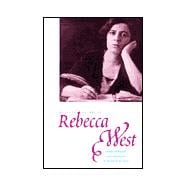The letters, which are presented in full, include correspondence with West's famous lover H. G. Wells and with Shaw, Virginia Woolf, Emma Goldman, Noel Coward, and many others; offer pronouncements on such contemporary authors as Norman Mailer, Nadine Gordimer, and Arthur Schlesinger, Jr.; and provide new insights into her battles against misogyny, fascism, and communism. West deliberately fashions her own biography through this intensely personal correspond








